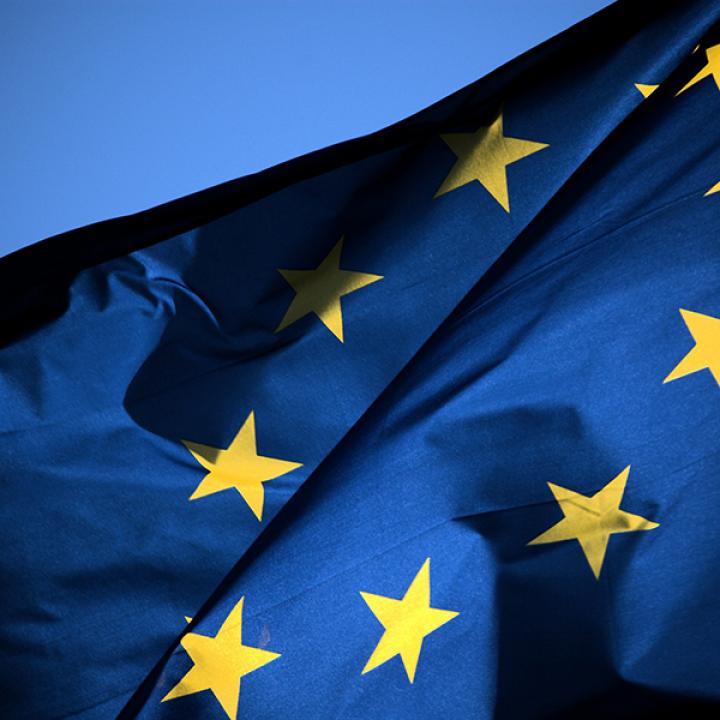

Although their ultimate effects are uncertain, the new sanctions are a powerful signal that European governments are readier than ever to confront the regime’s human rights violations, drone deliveries to Russia, and nuclear stalling.
On November 14, the European Union adopted its third sanctions package of the year against the Iranian regime. The biggest batch to date, it comprised thirty-two human rights-based designations and four related to the Ukraine war, indicating that European capitals are more comfortable with expanding pressure on Tehran for its ongoing efforts to crack down on protesters, stall nuclear negotiations, and provide weapons to Russia.
Europe’s Frustrations
Since the EU adopted its first round of human rights sanctions against Tehran on October 17, protests have continued around the country, and the regime has responded with force. According to the NGO Iran Human Rights, at least 326 people have been killed, including 43 children. Authorities have also tried to suppress the demonstrations by shutting down the internet and arresting some 15,000 people.
Meanwhile, the regime has sought to counter the resultant Western backlash through an orchestrated policy of hostage taking, primarily targeting European nationals. Citizens from Austria, Belgium, France, Germany, Italy, the Netherlands, Poland, and Sweden are currently in the Islamic Republic’s custody under false pretenses, as are several U.S. citizens. Despite the arrests, European governments appear undeterred in pursuing sanctions.
EU officials seem to be similarly disenchanted with Iran’s uncooperative stance on negotiating the revival of the Joint Comprehensive Plan of Action (JCPOA) and complying with its safeguards obligations. Tehran has tried to portray itself as the constructive party on both files, a point that Foreign Minister Hossein Amir-Abdollahian emphasized following a call with EU High Representative Josep Borrell earlier this month. In reality, however, it has failed to cooperate on numerous fronts, fueling frustration in European capitals and likely spurring the International Atomic Energy Agency’s Board of Governors to censure the regime at a meeting that begins on November 16.
European capitals are also concerned that Iran will provide Russia with additional combat drones for use against Ukraine, and perhaps even short-range ballistic missiles to help rebuild the Kremlin’s stockpile of precision-guided munitions. On November 5, after weeks of denials, Tehran finally acknowledged that it had provided some drones—but then claimed that all of the deliveries had taken place before the Ukraine invasion. In addition to concerns about arms deliveries, the G7 foreign ministers recently condemned the presence of Iranian trainers in Ukraine.
Latest Sanctions
The November 14 human rights sanctions targeted Interior Minister Ahmad Vahidi and various figures in the Islamic Revolutionary Guard Corps (IRGC), Basij militia, Law Enforcement Command, national army (Artesh), and cyber police. These included:
- Local and regional commanders involved in specific abuses such as the massacre of civilians in Zahedan (known as “Bloody Friday”), incidents of violence in Kurdistan Province, and the killing of a teenage girl who refused to sing a pro-regime song
- Four members of the morality police responsible for arresting Mahsa Amini, the young woman whose torture and death sparked the current protest movement
- Bonyad Taavon Basij, a foundation that provides social welfare services to Basij members and has an economic footprint in key Iranian industries
- Press TV, a state television network that may now have trouble operating or broadcasting in Europe
- ArvanCloud, a technology firm linked to the regime’s efforts to establish a separate Iranian intranet.
The EU also imposed sanctions on individuals and entities involved in supplying drones to Russia: IRGC chief Hossein Salami; the IRGC Aerospace Force and its commander, Amir Ali Hajizadeh; and Qods Aviation Industries. These four targets are notable because each was already designated under a separate EU authority linked to weapons of mass destruction, meaning the new sanctions will have no additional effect. Yet the WMD-related sanctions are set to be lifted in October 2023 under the terms of the JCPOA, so the drone-related designations will ensure that some sanctions remain in place past that date if necessary. (Salami faces human rights sanctions as well, so some of this layering is superfluous and a political signal in his case.)
The timing of the EU announcements appeared to be closely coordinated with the British and U.S. governments. London issued its own sanctions concurrently, while Washington released a statement of support within several hours and announced U.S. drone sanctions earlier today. The increased pace is noteworthy as well—in the previous nine years, the EU had issued only two human rights-based sanctions packages against Iran.
Yet the ultimate impact of these measures is unclear. By designating a wide range of Iranian security personnel—with ranks from sergeant up to brigadier-general—European authorities may have sought to warn that even low-level officers will be held responsible for any violence they commit. The question is whether that will significantly affect the loyalty of any individual security personnel or the political calculations of regime leaders. This seems unlikely at the moment.
Next Steps
In the coming weeks and months, the EU should keep up the momentum by imposing further costs on the Iranian regime. On November 14, French president Emmanuel Macron announced that he would support the establishment of an international fact-finding mission to investigate Iranian human rights violations at the Human Rights Council in Geneva, and pursuing this measure multilaterally would be a good start. Even without triggering the snapback of UN sanctions, the EU could escalate pressure on Iran’s energy sector, which provides critical resources to its military. Finally, the EU could strengthen restrictions on—and share more information about—the way Iran utilizes dual-use technology in its drone program.
Henry Rome is a senior fellow at The Washington Institute. Louis Dugit-Gros is a visiting fellow with the Institute and a diplomat with the French Ministry for Europe and Foreign Affairs; the views expressed herein are strictly personal.




